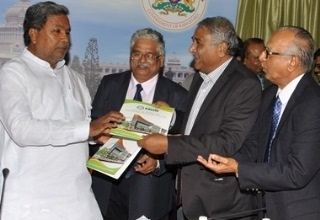MSME issues placed before Karnataka CM
Updated: Aug 26, 2014 03:54:08pm

The memorandum was submitted by President KASSIA, C M Rajamane here yesterday.
As far as trade license is concerned, KASSIA has asked the state government to issue a government order at the earliest abolishing trade license to all industries, which has been a long pending demand of the MSMEs.
Highlighting the issue of land to micro and small industries, the industry body has said that basic infrastructure requirement for an industry is land with good roads, water and sanitation and uninterrupted power supply. However, “the cabinet decision to allot on 99 years lease basis has become a retrograde step particularly to the Small Scale Industries,” it said.
KASSIA has asked the government to allot land below three acres only to micro and small industries under 10 years lease cum sale basis and exempt them from 99 years lease. Further, land allottees will have to be issued lease cum sale deed at the earliest.
With regard to the industrial policy, “The proposed Industrial Policy seems to be very well drafted but our experience is that implementation will take 2-3 years. Due to delay in issuing government notifications and subsequent publication in the State Gazette, implementation of the Policy does not take place at the intended pace,” the Memorandum said.
The memorandum pointed to other difficulties faced by industries in the existing industrial estates such as soaring prices, waiting period for allotment of land, frequent changes in criteria, lack of transparency which have caused delays in project implementation.
KASSIA has also called for the fixation of uniform property tax and a uniform tax policy in line with industrial zones formed by the central government.
Needless to say, shortage of power remains the biggest hindrance in the industrial development of Karnataka which has led to large scale production loss and financial crisis.
“The erratic power supply has contributed a lot to the misery of entrepreneurs. In order to lighten their sufferings, we suggest that the tax on electricity be exempted to the whole SME sector,” the memorandum said.
While the state government should expedite the separation of feeders and modernization of power grid, until the scheme is completed, ESCOMs should be able to purchase power from sources on a round-the-year basis at affordable cost as a short term measure, it said.
Considering that KASSIA is the nodal agency for more than six lakh small scale industries of Karnataka, and is aware of grievances from all across the state, the industry body would like its President to be represented on the Boards of KSFC, KIADB, KSPCB and all state PSUs which will go a long way in addressing the problems of industries.
Further, the industry body has requested the state government to issue suitable government notifications outlining the broad guidelines to frame the tender conditions suitable to SMEs which shall be binding on all purchasing departments as well as State PSUs. In addition, a reservation of 25 per cent of purchases by the State Departments and PSUs from the small industries located and registered in the State must be made mandatory, it said.
In view of several incentives provided to MNCs and large industrial houses such as Hero Moto Corp, Honda, Volvo, Scannia, and TATAs to set up units in Karnataka, the SME units want the government to make it mandatory for MNCs to buy from them.
For inclusive growth of MSME industry, trade and economy of the country, the MSMED Act has to be implemented and interest subsidy should be released immediately, it said.
The new proposed industrial policy specifies that the Entry Tax is being exempted for an initial period of only three years. This should be extended to a maximum period of 15 years in Zones 1, 2 and 3 of the Policy, according to KASSIA.
To hear the plight of MSMEs, the Deputy Commissioners of the respective Districts should be instructed to conduct periodic single window committee meetings at least once in a quarter.
KASSIA has also submitted a detailed list of changes needed in labour laws.
Besides, it has recommended that a census be conducted of small scale industries in the state. In this regard, KASSIA is willing to collect detailed information about the MSME industries and upload the same on KASSIA website as well as furnish the same to government agencies. It would also like to provide market leads, tender information, organise B2B meetings, vendor marts etc.
To take up the project of collecting total statistics of small scale industries of Karnataka at the earliest, KASSIA has asked for a special grant of Rs two crore to upgrade Kassia “E” service initiatives and total survey of MSME industries of Karnataka. (KNN/ES)












